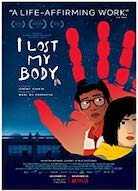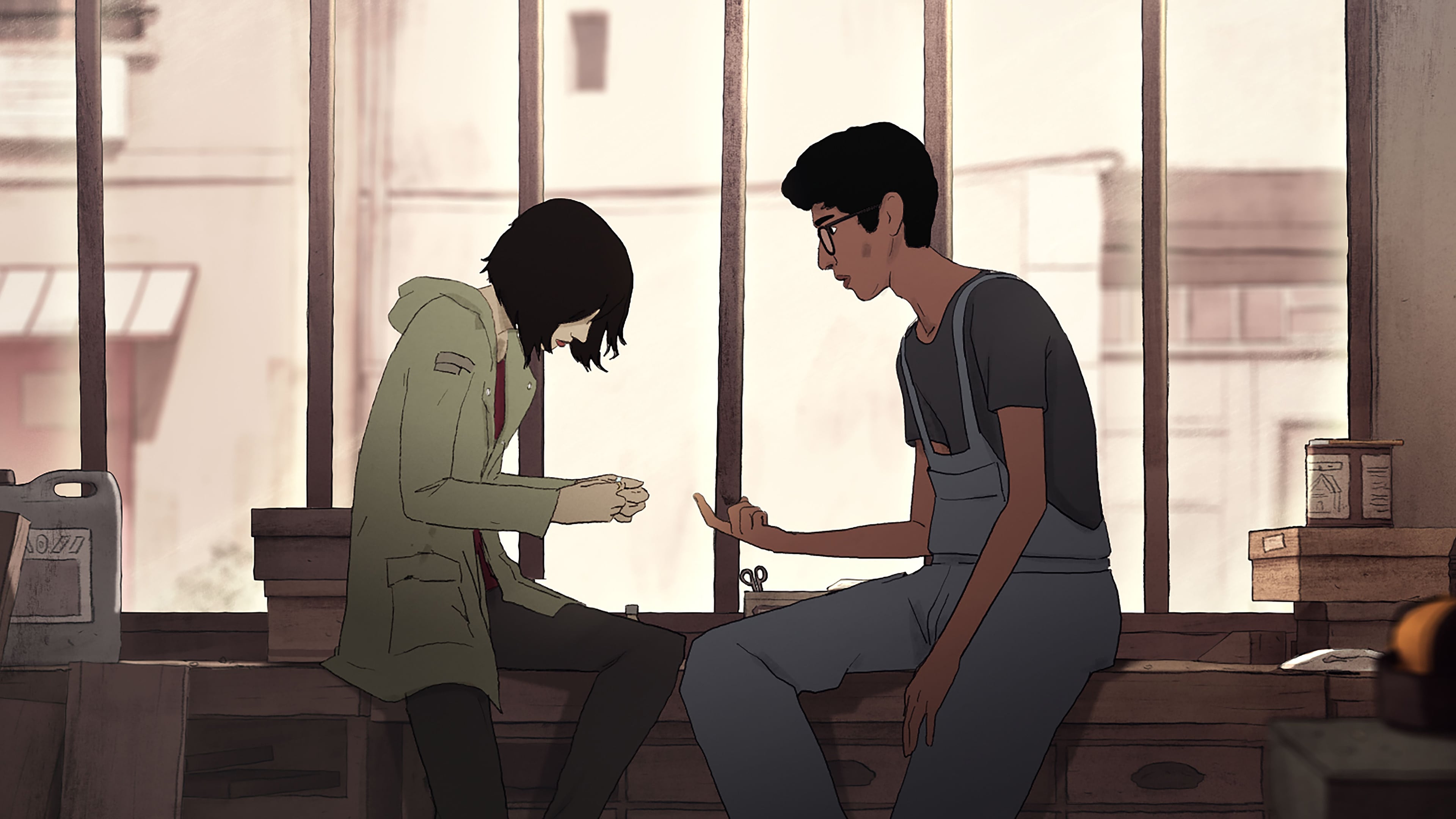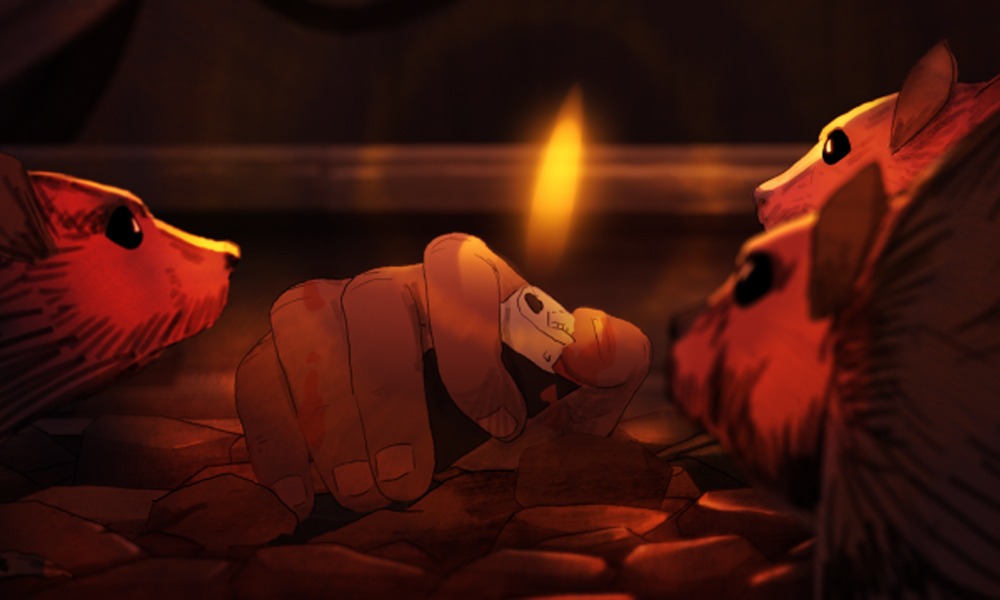by Tim
 I Lost My Body, the first animated film to win the top prize at the Cannes International Critics's Week, is nothing if not distinctive. The "I" of the title is a sapient severed hand, which spends the length of the feature skittering around on its fingers, looking for the human to whom it used to be attached; this is a journey that is by turns bittersweet, sentimental, and horrifying. Director Jérémy Clapin, making his feature debut (he was also responsible for the celebrated 2008 short Skhizein), spent years sheperding this project into existence, and it has the unmistakable feeling of a passion project, one whose odd shifts in tone and moody emotional appeals are wonderfully earnest. While it is probably not the best animated feature of 2019, it's surely the most uncompromised and confident.
I Lost My Body, the first animated film to win the top prize at the Cannes International Critics's Week, is nothing if not distinctive. The "I" of the title is a sapient severed hand, which spends the length of the feature skittering around on its fingers, looking for the human to whom it used to be attached; this is a journey that is by turns bittersweet, sentimental, and horrifying. Director Jérémy Clapin, making his feature debut (he was also responsible for the celebrated 2008 short Skhizein), spent years sheperding this project into existence, and it has the unmistakable feeling of a passion project, one whose odd shifts in tone and moody emotional appeals are wonderfully earnest. While it is probably not the best animated feature of 2019, it's surely the most uncompromised and confident.
The film, adapted by Clapin and Guillaume Laurant from Laurant's novel Happy Hand (his other film credits include Amélie, and the echoes of that story ring very loudly here), divides itself into two strands. One is about that hand, deftly making its way through the all the dangers that reside six inches above the ground in Paris. The other is a quasi-romantic drama about a lost soul, twentysomething sad sack Naoufel (Hakim Faris)...
Though he has two hands when we first meet him, it's not very hard to guess where this is heading, given that the first image of the movie is of Naoufel's blood-spattered face, and within the opening minutes, the hand has had gauzy, black-and-white flashbacks of Naoufel as a child. Even so, the twin stories don't really comment on each other in any sustained way. The hand's journey is a marvelous adventure, starting from its hushed, horror movie opening, in which the hand scrambles its way out of a refrigerator packed full of bits and pieces of human bodies, including a most ominous mound of eyeballs. Naoufel's story is perfectly… fine.
He's on his own in the world, working as a pizza delivery boy, a job which he performs with extremely limited skill. It's in this capacity that he ends up on the receiving end of an irritated voice (Victoire Du Bois) on an intercom one rainy night: he has arrived 40 minutes late with a hopelessly mangled pizza. Despite this, she takes pity on his on his haplessness, and chats with him at some length before he returns to the dark, wet night. This being the first decent human connection he's made possibly ever, he tries to track down the owner of that voice, Gabrielle, eventually taking a job working as assistant to her ailing carpenter uncle, Gigi (Patrick d'Assumçao). Here, while attempting to endear himself to Gabrielle, he spends a great deal of time around power tools with sharp edges.

The fully-membered human story of I Lost My Body isn't new in any way. Hopelessly sad boys have been stalk-courting prickly women for decades in the movies; animating them both doesn't do very much at all to freshen things up. The film is better as a character study, circling its way around Naoufel's deep feeling of disconnection from people, though it's still not quite exciting. It doesn't help matters that, despite how striking the film looks in still images, with the angular lines defining its human characters' faces, the animated movement in the film is a little stiff and inorganic. The film's production involved animating everything in 3D on computers, and then hand-painting over the characters (the animation blog Cartoon Brew has a remarkable series of videos demonstrating the process), but unlike most computer animation, which defaults to 24 frames per second, Clapin had his team of artists working mostly at 12 frames per second, to better evoke the look of traditional animation. It's a fine impulse, but in practice it makes the characters look jerky and slightly robotic, putting up a wall between the viewer and the emotions of the story.
When the film is focused on the hand, though, it's amazing. All of the same things that make the human animation seem slightly off-putting is a much better fit for the hand, an inherently grotesque "character" even in the moments that aren't deliberately courting horror movie imagery. It is necessarily uncanny, and the filmmakers accentuate that quality through the movement as well as as through the clever "acting" that the hand does as it observes the world around it. That hand's-eye view approach also means that the film can present some surprising, crafty angles that make any location seem awe-inspringly large and detailed, or dangeously overwhelming. It's a terrific use of animation, giving us a bold and idionsyncratic perspective that covers pretty much every available emotion.
Perhaps even more than any aspect of its visual technique, the film benefits from its score by composer Dan Levy. The film's music is heavy on synthesizers, creating an even dreamier, more otherworldly mood than the imagery has already done, exaggerating the touches of horror and the beautiful spectacle as well. It's a perfect fit for a film that, whatever its flaws, creates one of the most idiosyncratic new worlds of any animated film of the year.

More on the Animated Contenders
Frozen 2
Klaus
This Magnificent Cake
Missing Link (Interview)
White Snake
Ne Zha
How To Train Your Dragon: The Hidden World
The 32 Eligible Films
Current Predictions